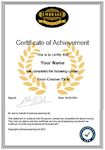Asperger’s Syndrome
Supporting People with Asperger's - Elearning course with study materials, assessment and certificates included.
Embrace- Learning LTD
Summary
- Certificate of completion - Free
- Exam(s) / assessment(s) is included in price
Overview
This e-learning course, Supporting People with Asperger’s Syndrome, defines Asperger’s syndrome, examines how it fits into the autism spectrum and identifies how it affects the way people think and behave.
The course explores common difficulties that people with the condition experience, for example in terms of communication and memory, and looks at techniques for helping them to cope with these on a day-to-day basis. Learners will be able to apply this information to the way they provide support for people who have Asperger’s.
Course media
Description
Unit 1 defines Asperger’s syndrome and explains how it fits into the autism spectrum. Learners will look at possible causes of the condition and discover why early diagnosis is beneficial to all concerned. By outlining the research carried out by Kanner and Asperger, this unit also provides learners with an insight into the theories surrounding autism and the conditions associated with it. The unit concludes by looking at models of disability and identifying how Asperger’s fits into the social approach.
Unit 2 introduces learners to some of the common difficulties experienced by many people with Asperger’s syndrome and looks particularly at problems which can affect
their ability to communicate, both verbally and through body language. The unit also
provides some tips for helping someone with Asperger’s to overcome some of their worries about communicating with others.
Unit 3 provides an insight into how autism can affect the way people behave, how they think and how they view the world. It looks at the kinds of problems they face, for example remembering processes and sensory sensitivity, and considers possible solutions. The unit then goes on to look at the legislation in place to protect people with autism and outlines the importance of adopting a person-centred approach to planning their support.
The objectives for each study unit are that learners will be able to:
- define autism and Asperger’s syndrome
- identify possible causes of the condition
- understand the benefits of an early diagnosis
- provide an outline of the theory behind autism spectrum conditions
- describe two models of disability and decide which approach is more effective in terms of Asperger’s
- list some of the common difficulties that people with Asperger’s experience
- explain why communicating can be problematic for some people within the autism spectrum
- draw on tips and guidelines in order to help people communicate more easily and effectively
- describe why communication and interaction in general are viewed so differently by some people with Asperger’s
- explain how those with autism differ from other people in the way they view the world
- describe the ‘theory of mind’ experiment and how it is used as a diagnostic tool
- suggest possible solutions to overcome a person’s memory problems or sensory sensitivity
- identify the legislation in place to help people with disabilities
- explain what a person-centred approach is and identify its benefits.
Questions and answers
Currently there are no Q&As for this course. Be the first to ask a question.
Certificates
Certificate of completion
Digital certificate - Included
Reviews
Currently there are no reviews for this course. Be the first to leave a review.
Legal information
This course is advertised on reed.co.uk by the Course Provider, whose terms and conditions apply. Purchases are made directly from the Course Provider, and as such, content and materials are supplied by the Course Provider directly. Reed is acting as agent and not reseller in relation to this course. Reed's only responsibility is to facilitate your payment for the course. It is your responsibility to review and agree to the Course Provider's terms and conditions and satisfy yourself as to the suitability of the course you intend to purchase. Reed will not have any responsibility for the content of the course and/or associated materials.


